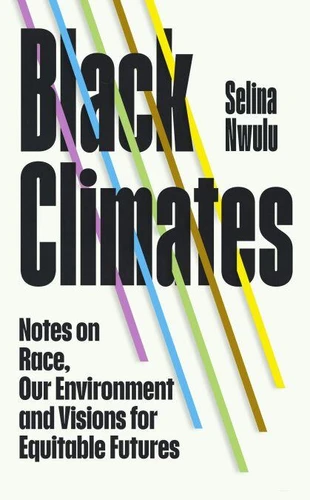Black Climates. notes on Race, our Environment, and visions for Equitable Futures
Par :Formats :
Actuellement indisponible
Cet article est actuellement indisponible, il ne peut pas être commandé sur notre site pour le moment. Nous vous invitons à vous inscrire à l'alerte disponibilité, vous recevrez un e-mail dès que cet ouvrage sera à nouveau disponible.
Disponible dans votre compte client Decitre ou Furet du Nord dès validation de votre commande. Le format ePub protégé est :
- Compatible avec une lecture sur My Vivlio (smartphone, tablette, ordinateur)
- Compatible avec une lecture sur liseuses Vivlio
- Pour les liseuses autres que Vivlio, vous devez utiliser le logiciel Adobe Digital Edition. Non compatible avec la lecture sur les liseuses Kindle, Remarkable et Sony
- Non compatible avec un achat hors France métropolitaine
 , qui est-ce ?
, qui est-ce ?Notre partenaire de plateforme de lecture numérique où vous retrouverez l'ensemble de vos ebooks gratuitement
Pour en savoir plus sur nos ebooks, consultez notre aide en ligne ici
- Nombre de pages400
- FormatePub
- ISBN978-1-5299-3447-2
- EAN9781529934472
- Date de parution28/08/2025
- Protection num.Adobe DRM
- Infos supplémentairesepub
- ÉditeurVintage Digital
Résumé
To want to 'save the planet', a person has to have a sense of belonging in it.What would a saved planet look like for a Black collective?'This book is validating and monumental' Courttia NewlandGlobally, Black people are among the most affected by the climate crisis, despite contributing very little to it. For a long time, the crisis was portrayed as yet another injustice for Black people to care about, on top of the day-to-day oppression they face.
In Black Climates, Selina Nwulu reframes the crisis to encompass our disconnection from each other and the world around us. She argues that the root of climate change lies in historical colonial violence and ongoing exploitation, making it inherently racist. Nwulu, former Young People's Laureate for London, uses her poetic and skilful voice to directly address Black British readers who have been previously ignored in mainstream environmental conversations.
She includes interviews with a wide range of creatives and campaigners to explore a variety of subjects, including air pollution, prison ecology, disability justice, migration, food, nature, community care, and radical imagination. This is an essential and empowering read for anyone who wants to fully understand the connections between Blackness and the climate crisis, providing the tools to envisage more equitable futures.
In Black Climates, Selina Nwulu reframes the crisis to encompass our disconnection from each other and the world around us. She argues that the root of climate change lies in historical colonial violence and ongoing exploitation, making it inherently racist. Nwulu, former Young People's Laureate for London, uses her poetic and skilful voice to directly address Black British readers who have been previously ignored in mainstream environmental conversations.
She includes interviews with a wide range of creatives and campaigners to explore a variety of subjects, including air pollution, prison ecology, disability justice, migration, food, nature, community care, and radical imagination. This is an essential and empowering read for anyone who wants to fully understand the connections between Blackness and the climate crisis, providing the tools to envisage more equitable futures.
To want to 'save the planet', a person has to have a sense of belonging in it.What would a saved planet look like for a Black collective?'This book is validating and monumental' Courttia NewlandGlobally, Black people are among the most affected by the climate crisis, despite contributing very little to it. For a long time, the crisis was portrayed as yet another injustice for Black people to care about, on top of the day-to-day oppression they face.
In Black Climates, Selina Nwulu reframes the crisis to encompass our disconnection from each other and the world around us. She argues that the root of climate change lies in historical colonial violence and ongoing exploitation, making it inherently racist. Nwulu, former Young People's Laureate for London, uses her poetic and skilful voice to directly address Black British readers who have been previously ignored in mainstream environmental conversations.
She includes interviews with a wide range of creatives and campaigners to explore a variety of subjects, including air pollution, prison ecology, disability justice, migration, food, nature, community care, and radical imagination. This is an essential and empowering read for anyone who wants to fully understand the connections between Blackness and the climate crisis, providing the tools to envisage more equitable futures.
In Black Climates, Selina Nwulu reframes the crisis to encompass our disconnection from each other and the world around us. She argues that the root of climate change lies in historical colonial violence and ongoing exploitation, making it inherently racist. Nwulu, former Young People's Laureate for London, uses her poetic and skilful voice to directly address Black British readers who have been previously ignored in mainstream environmental conversations.
She includes interviews with a wide range of creatives and campaigners to explore a variety of subjects, including air pollution, prison ecology, disability justice, migration, food, nature, community care, and radical imagination. This is an essential and empowering read for anyone who wants to fully understand the connections between Blackness and the climate crisis, providing the tools to envisage more equitable futures.



